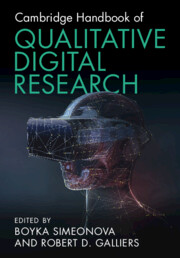Book contents
- Cambridge Handbook of Qualitative Digital Research
- Cambridge Handbook of Qualitative Digital Research
- Copyright page
- Contents
- Figures
- Tables
- Contributors
- Preface
- Part I Philosophical, Epistemological and Theoretical Considerations
- Chapter 1 Introduction
- Chapter 2 A Philosophical Perspective on Qualitative Research in the Age of Digitalization
- Chapter 3 Data as a Contingent Performance and the Limitations of Big Data
- Chapter 4 Big Data, Little Understanding
- Chapter 5 Power, Knowledge and Digitalization
- Chapter 6 Information Technology and Power
- Part II Methodological Considerations
- Part III Illustrative Examples and Emergent Issues
- Index
- References
Chapter 4 - Big Data, Little Understanding
from Part I - Philosophical, Epistemological and Theoretical Considerations
Published online by Cambridge University Press: 08 June 2023
- Cambridge Handbook of Qualitative Digital Research
- Cambridge Handbook of Qualitative Digital Research
- Copyright page
- Contents
- Figures
- Tables
- Contributors
- Preface
- Part I Philosophical, Epistemological and Theoretical Considerations
- Chapter 1 Introduction
- Chapter 2 A Philosophical Perspective on Qualitative Research in the Age of Digitalization
- Chapter 3 Data as a Contingent Performance and the Limitations of Big Data
- Chapter 4 Big Data, Little Understanding
- Chapter 5 Power, Knowledge and Digitalization
- Chapter 6 Information Technology and Power
- Part II Methodological Considerations
- Part III Illustrative Examples and Emergent Issues
- Index
- References
Summary
Big data has been proclaimed as revolutionary and transformative, and will alter businesses and society in fundamental ways. Such dramatic claims sound suspiciously like prior technological waves which were also promoted as metamorphic. Most of these past ‘revolutionary’ technologies have proved to be more evolutionary than revolutionary, but is the same likely to be true with big data? This chapter examines a number of the underlying assumptions associated with the supposed big data revolution. It highlights some of the fallacies and misconceptions that lie behind big data, and how these assumptions can lead to unintended and dysfunctional consequences. In particular, it explores how these dysfunctions might manifest themselves when it comes to organizational knowledge and practice. The analysis in the chapter leads to the conclusion that while big data offers promise, the hype surrounding it has obscured the potential dangers in its use. The chapter explains that it is important to take a more nuanced view of this new technology, putting safeguards in place to ensure that big data use (including big data analytics, machine learning, artificial intelligence and the algorithms they develop) does not lead to dysfunction.
Information
- Type
- Chapter
- Information
- Cambridge Handbook of Qualitative Digital Research , pp. 43 - 59Publisher: Cambridge University PressPrint publication year: 2023
